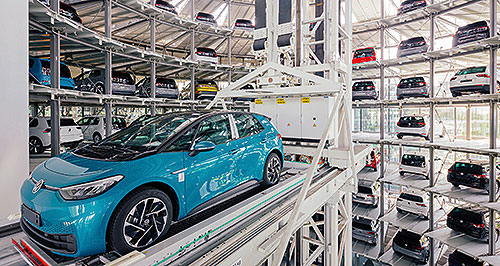News - Industry NewsIndustry responds to EU ICE ban proposalMarket forces: In the absence of federal EV policy, Australia could face vehicle supply issues due to the growing number of countries and regions setting dates for the ban of new petrol and diesel cars, warns Volkswagen. Green Deal proposal to ban tailpipe CO2 emissions from new cars sold in EU from 203515 Jul 2021 THE European Union has proposed a 100 per cent carbon dioxide emissions target for cars and vans by 2035 that will effectively ban the sale of new petrol and diesel models within the bloc, supported by a massive uplift in charging and hydrogen refuelling infrastructure.
Announced as part of the wide-ranging EU Green Deal climate-change response package, the proposed reform aims to cut overall EU transport emissions by 90 per cent by 2050.
It should also help harmonise the various European countries and cities that have already announced bans on petrol and diesel vehicles – along with the growing list of non-EU nations in the region – as well as various countries and states in the Americas and Asia.
European automotive industry groups have criticised the proposal for being too reliant on specific technologies and anti-choice, although a handful of individual manufacturers have been more positive.
Volkswagen Group Australia – the biggest-selling European car-maker in this market – considers the EU proposal as a positive step but warns that Australia faces potential vehicle supply risks if transport emissions policy continues to lag behind other developed regions.
Under the proposal, the EU’s 2030 CO2 emissions reduction targets for light vehicles have also been substantially beefed up, from 37.5 per cent to 55 per cent for cars and from 31 per cent to 50 per cent for vans.
Public EV charging and hydrogen refuelling infrastructure targets will be based on the size of each member state’s vehicle fleet, with DC rapid chargers outputting at least 300kW for light vehicles and 1400kW for heavy vehicles required every 60km along main roads by 2025.
The proposal stipulates that the infrastructure must “be widely available, interoperable and easy to use” and estimates that the targets will result in more than 16 million public EV charging stations becoming available across the EU by 2050, up from around 225,000 at the end of last year.
It is targeting a million EV chargers across the 27 member states by 2025 and by 3.5 million by 2030, growing to 11.4 million by 2040.
Around 125 hydrogen filling stations already exist in the EU, but this will have to rapidly increase to meet the proposal’s target of hydrogen infrastructure for heavy vehicles to be located every 150km along main roads by 2030, as well as those suitable for heavy and light vehicles in every town and city.
European Automobile Manufacturers Association (ACEA) president and BMW Group CEO Oliver Zispe criticised the proposal as “mandating, or effectively banning, a specific technology”.
German Association of the Automotive Industry (VDA) president Hildegard Müller said the zero-carbon emissions requirement was “anti-innovation and the opposite of open to technology”.
“It also restricts consumers’ freedom of choice,” she said, adding that the impact of jobs and associated social consequences had not been considered in the proposal.
The European Association of Automotive Suppliers (CLEPA) claimed that internal-combustion engines could be climate neutral when renewable fuels were used, just as EVs are only climate neutral when charged with renewable energy.
“The priority should be renewable fuels and electricity, not a ban on a technology,” said CLEPA secretary general Sigrid de Vries.
Ms Müller also called for renewable fuels to be given more recognition, claiming that a 30 per cent quota would be required by 2030 for existing combustion-powered vehicles to also contribute to emissions targets.
Volvo, which has already committed to becoming a 100 per cent electric brand by 2030, welcomed the proposal as “necessary if our industry is to support the EU in reaching climate neutrality by 2050” and the 2035 zero-emissions target as far enough in the future to “phase out technology of the past”.
VW Group Australia PR and group electric vehicles manager Kurt McGuiness told GoAuto the EU proposal was positive and “certainly not unexpected” but aired concerns about the future availability of European vehicles to this market.
“As Europe and the rest of the world move towards cleaner, more sustainable mobility, Australia still lags behind,” he said.
“The reality is, we’re a small market at the end of a very long shipping route that’s out of step with most of the developed world. While virtually all of our products are produced in Europe, if Australia’s market incompatibility with Europe’s standards continues, there’s no telling what we may have to source, and where from.”
In an interview with German automotive journal Automobilwoche, Mercedes-Benz Cars chief operating officer Markus Schäfer described the proposal as “very, very ambitious”.
“It's not unrealistic, but it will require a major restructuring of society,” he said, adding that the charging infrastructure project and related energy industry restructure would be a “Herculean task”.
On the topic of infrastructure, the EU proposes that in 2030 EV chargers of at least 300kW must be located every 60km on regional roads and 600kW on main roads, with all to be at least 600kW by 2035. Under these plans, it estimates 11.4 million charging stations will become available by 2040.
In addition, by 2030 heavy vehicle chargers of 3500kW capacity will be mandated every 60km and 1400kW every 100km on regional roads, as well as in every town, city and “safe and secure” parking area, with 3500kW heavy vehicle chargers mandated every 100km on regional roads by 2035.
An extended transport emissions trading system is also proposed across roads, aviation and shipping as well as measures to tax carbon-intensive imports, with revenues used to support vulnerable households and reinvested in cleaner transport methods.  |
Click to shareIndustry News articlesMotor industry news |














Facebook Twitter Instagram